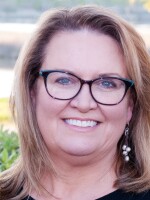The Hofer family in Bayou La Batre, Ala., is struggling to stay afloat both financially and emotionally. Since the BP oil spill, Aaron, 27, has been largely out of work. Lena, 25, is getting counseling to help her cope and says she has finally convinced her husband, an Iraq war veteran, to get help at the Department of Veterans Affairs.
"To be honest with you, I would say that my husband would hurt himself," Lena says, "because he's never not been able to provide for us. To see my husband cry over not being able to take care of us, it worries me."
Aaron, a fourth-generation shrimper, has been close to giving up.
"If it wasn't for my children, I probably would have already committed suicide," he says. He says he came close a few weeks ago after he and Lena separated for a time.
"I found myself on an eighth story of a building," he says. "And I looked down and just sat down and thought about it.
"I've lost my wife. I've betrayed my children. I can't get help, and I can't help them. Maybe they'll have a better life."
Similarities Between BP Spill And Exxon Valdez
Experts say a man-made disaster like the Gulf oil spill can alter the way a community functions. And they are finding similarities between the Exxon Valdez oil spill in Prince William Sound, Alaska, on March 24, 1989, and the April 2010 spill in the Gulf of Mexico -- including mental health problems found after the Exxon Valdez disaster.
"It's almost like Exxon Valdez fast-forward," says Steven Picou, an environmental sociologist at the University of South Alabama. Picou has spent the past 20 years tracking the mental health fallout around Prince William Sound.
"In Alaska, the communities up there were blindsided," he says. "They did not realize what was happening to them until the suicides started and the divorces started and the domestic violence became acute in the communities."
Picou is seeing the same problems now on the Gulf Coast, even sooner than they surfaced after the Exxon Valdez spill. In Alaska, he says, there were seven suicides starting about four years after the spill. He says at least two suicides have been linked to distress over the BP oil spill.
In response, the Red Cross, houses of worship and mental health providers have stepped up counseling and outreach. Picou is training "peer listeners" -- people ready to identify oil spill-related stress and help their families and neighbors cope.
Lena Hofer says she has been surprised by the toll the BP spill has taken on her family.
"You would never think that something like that happening would affect your whole life like this," she says.
The family has been homeless for months, bouncing around with relatives, she says, and her 2-year-old son Justin started biting his fingernails when they moved out of their house. The impact has been gentler on 4-year-old Jordan, who is in school during the day.
"I mean, we suffered Katrina. We made it through it," she says. "But that didn't take our livelihood. That just took away what we had gotten with our livelihood. And you can get any material thing back."
Natural Disaster Versus Man-Made Disaster
Experts say there's a big difference between what happens after a natural disaster like Hurricane Katrina and what happens in the aftermath of a technological disaster such as the BP oil spill.
Therapist Pam Maumenee, who is on the oil spill crisis team at AltaPointe Health Systems in Bayou La Batre, Ala., says natural disasters tend to build helping, therapeutic communities.
"Everybody comes out after a hurricane. You clean up. You bond together," Maumenee says.
People are stealing, lying, cheating, doing anything they can to make it. I don't want to end up like that. I really don't.
But the opposite is true of a man-made disaster like the oil spill, she says.
"What you see are families against families, brothers against sisters, neighbors against neighbors," she says. "The community becomes quite corrosive."
There have been battles over who got lucrative contracts to work the BP cleanup and who didn't. And there's growing resentment over the claims process in the community.
The Hofers received just $1,700 for their emergency six-month payment, because much of Aaron's pay was in cash and he doesn't have the proper documentation.
Lena says she has seen the corrosive dynamic unfold in the tiny fishing village settled by her French ancestors more than 200 years ago.
"Bayou La Batre has always been a community that strived through anything, you know," she says. "It's taken a toll on it bad. People are stealing, lying, cheating, doing anything they can to make it. I don't want to end up like that. I really don't."
Sociologists warn that if the Exxon Valdez experience in Alaska is a model, the worst could be yet to come.
Copyright 2023 NPR. To see more, visit https://www.npr.org. 9(MDAzMjM2NDYzMDEyMzc1Njk5NjAxNzY3OQ001))








